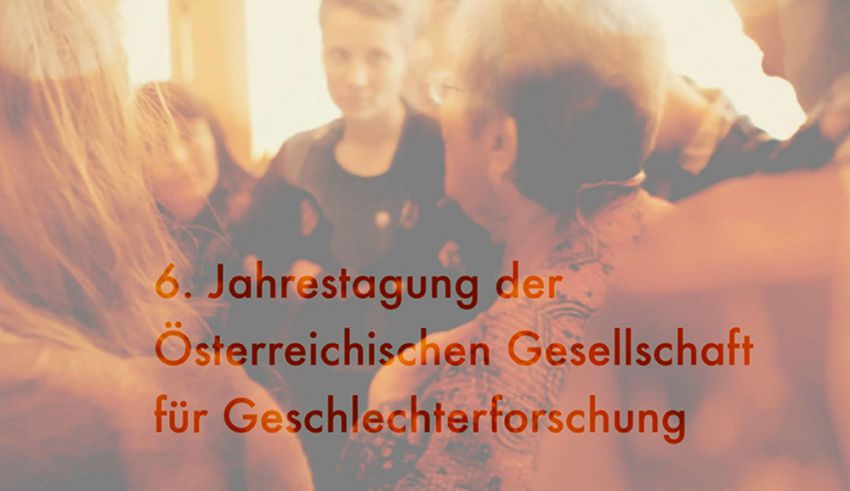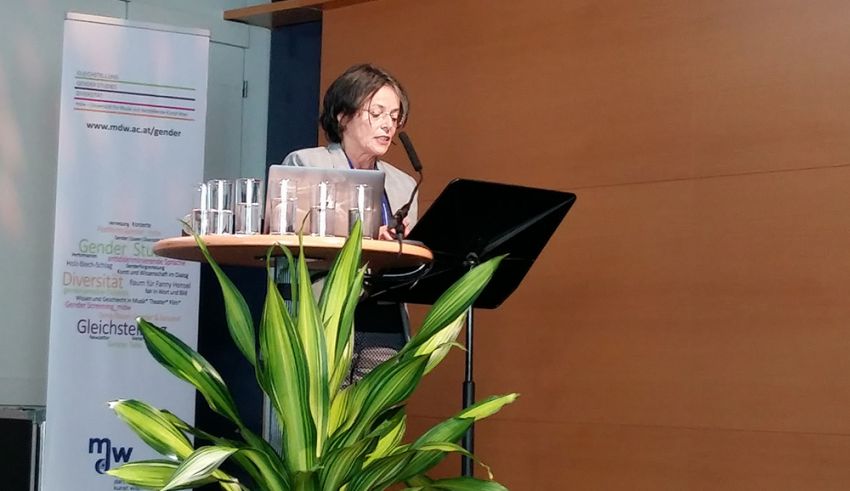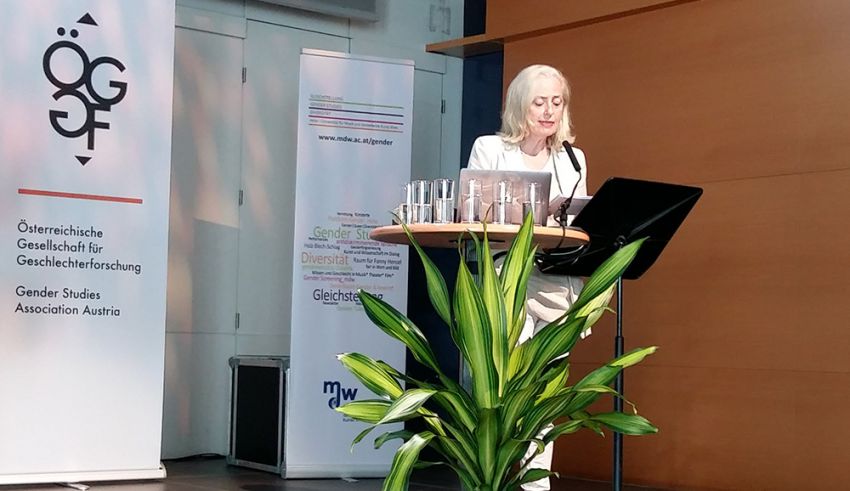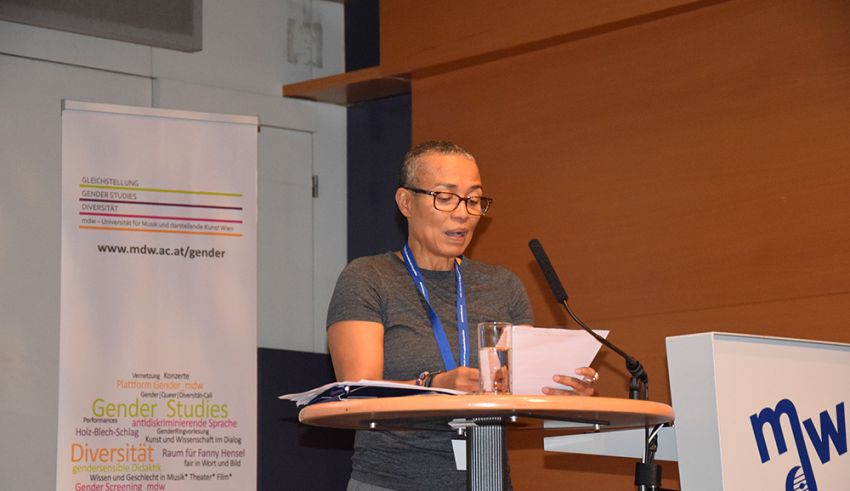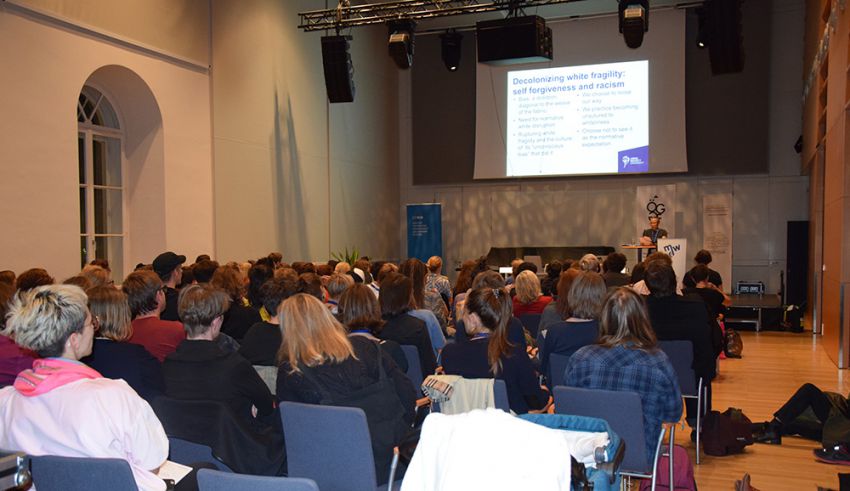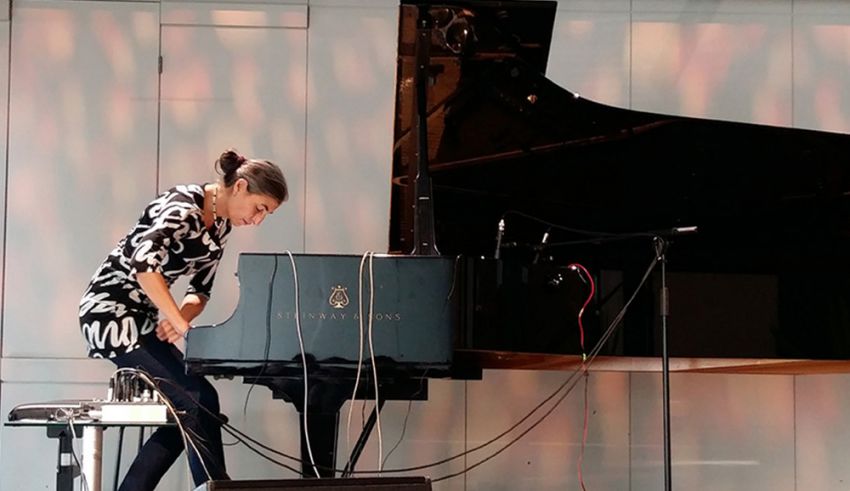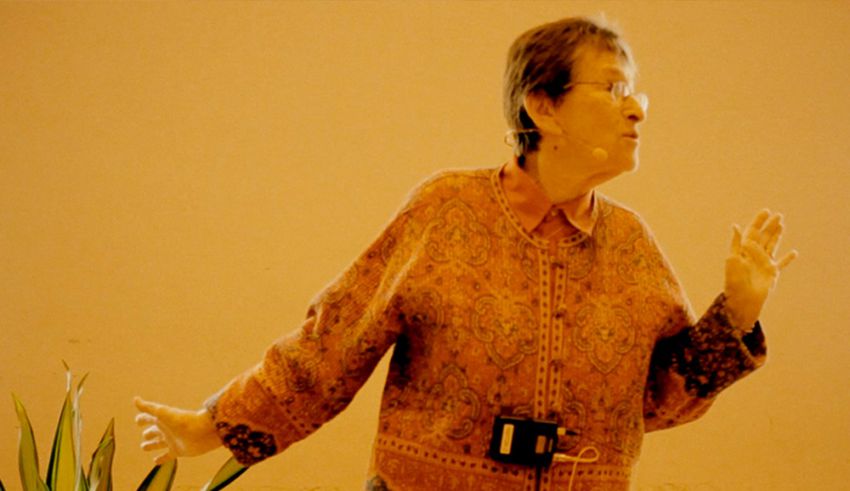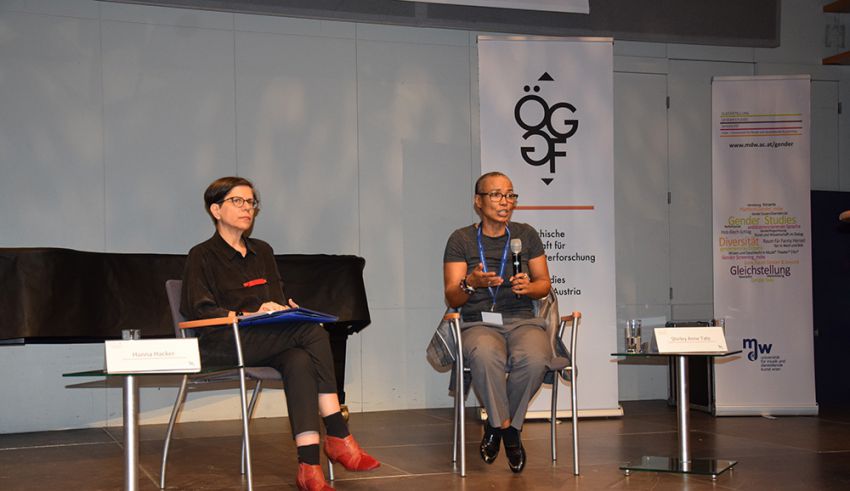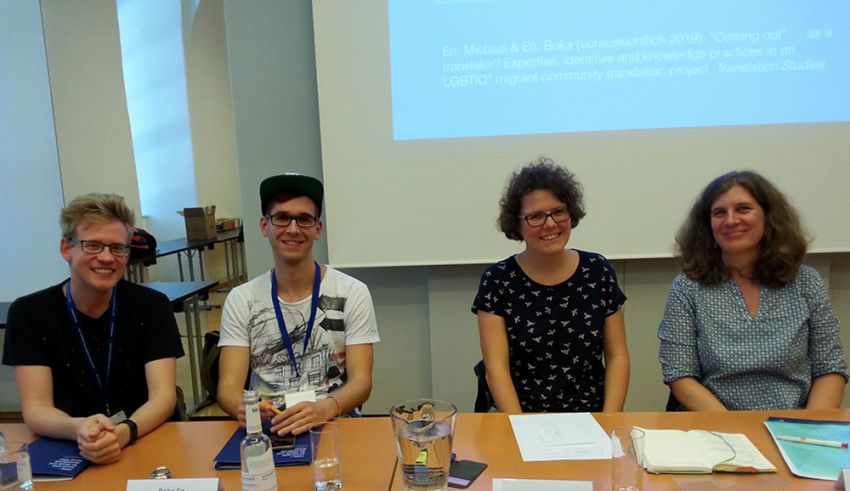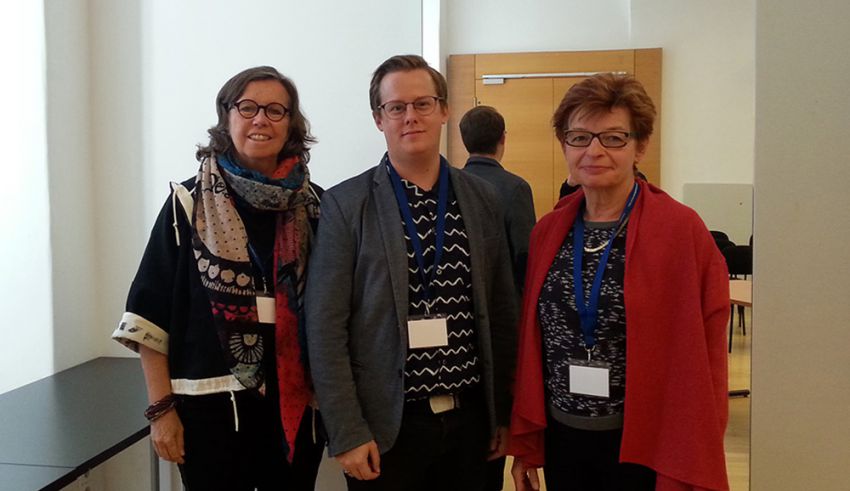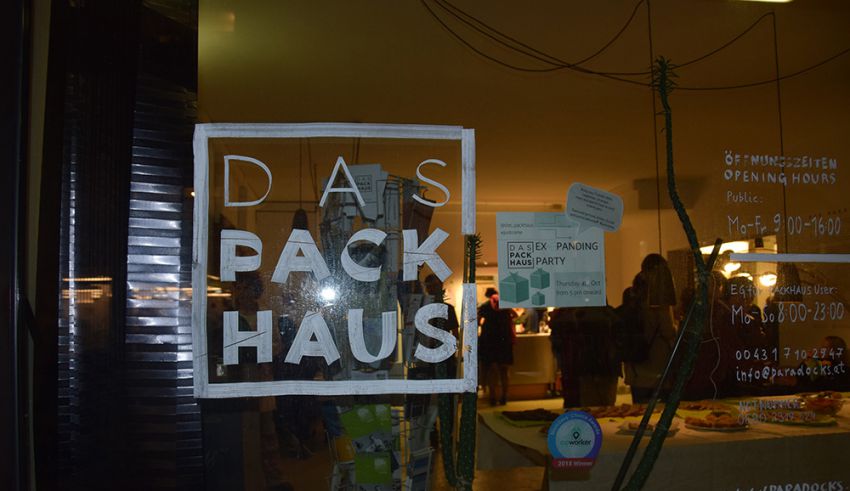English translation: Christopher Roth
What do we know about knowledge, and how is this related to gender and diversity?
The sixth edition of the Annual Conference of the Gender Studies Association Austria (ÖGGF), which took place this year, was hosted by the mdw and brought together 250 participants under the thematic heading of “Cultures of Knowledge and Diversity. Positions, Diffractions, Participations”.
This year’s conference team (Andrea Ellmeier, Birgit Huebener, Doris Ingrisch, and Ela Posch) placed its focus on hybrid artistic-theoretical formats and invited individuals from all research-related, artistic, and technical disciplines to take advantage of this space for reflection, knowledge exchange, and criticism. And it was thus that over 100 lecturers presented their research and discussed the circulation of various forms of knowledge and their effects in relation to gender and diversity from 27 to 29 September.
“I found the conference to be a highly open space of interdisciplinarity, adding dimension to the usual compositions and conversations of that notion via discussions and interventions of aesthetics, life practices, disparate iterations and methodologies; a highly creative and intellectually inclusive zone.”
Dorothy Geller, conference participant
Currency and Social Relevance
The promising opening words delivered by mdw Rector Ulrike Sych, Gerda Müller (Vice-Rector For Organisational Development, Gender & Diversity, mdw), Iris Rauskala (Section Head, Science and Research, Federal Ministry of Education, Science and Research), Maria Mesner (Chair, ÖGGF), Andrea Ellmeier (head of the Administrative Department for Equality, Gender Studies and Diversity, mdw), and Doris Ingrisch (professor at the Department of Cultural Management and Gender Studies, mdw) were topped off by Katharina Klement’s artistic contribution Vessel 1.3, a performance that rendered audible the transdisciplinary spectrum of this conference’s diverse programme.
The combined thematic scope of the two keynote lectures, given by two notable representatives of past and present research on gender, already drew a consequential and fascinating thematic arc: literary scholar and psychologist Evelyn Torton Beck (USA), who had been forced into exile by the National Socialist regime as a child in 1938, documented the historical development of feminist research in light of her own biography, while cultural sociologist Shirley-Anne Tate (GB) focused her highly charged analysis of discriminatory mechanisms in academia on the issue of institutional racism, which is so central to the discourse on diversity.
“For me, Professor Tate’s lecture was timely both on a personal level and on a political level. So many black people and people of colour suffer in white spaces and do so in silence, since their struggles are delegitimised and depoliticised. It was clear that this was a shared sentiment throughout her lecture where BPoC audience members were triggered to relive memories of when they had even doubted themselves, their own feelings. I found it necessary and relieving to finally have had our feelings put into words we previously could not articulate.”
Tonica Hunter, conference participant
Pre-Conference & Poster Session
AG Nachwuchs [the Early-Career Working Group] of the ÖGGF (oeggf.at/ag-nachwuchs) joined forces with its German counterpart AG Perspektiven, part of the Deutsche Fachgesellschaft für Geschlechterstudien, ([German Specialist Society for Gender Studies], fg-gender.de/arbeitsgruppen/perspektiven/) to organise a well-attended pre-conference with a networking focus. A World Café format saw three thematic areas (Precarities in Academic Life, Attacks on Gender Studies, and Critical Knowledge Production and Access to Gender Studies) discussed along with possible and already-implemented strategies as well as ways in which the respective specialist societies might provide support.
“AG Nachwuchs and AG Perspektiven are delighted at the high level of participation in the 2018 pre-conference and invite all those who are interested to participate in our two working groups!”
AG Nachwuchs_Perspektiven
The poster session also held by these two groups likewise presented a broad thematic spectrum ranging from sexual(ised) violence in music therapy to gender-sensitive teaching and on to diversity and the idea of an open-access publication platform for gender studies, all of which were addressed in visibly appealing presentations of information produced by the contributing participants.
The Arts in Dialogue with the Sciences
This year’s conference paid the relationship between the sciences and the arts, which has long been a heavily discussed topic, special attention in the form of artistic and experimental research approaches as well as via dialogue-oriented and artistic-scholarly formats (e.g. Forschen zwischen Wissenschaft und Kunst [Research between Science and Art] and Feministische, künstlerische, kollektive Praxen als spezifische Formen der Wissensproduktion [Specific Forms of Knowledge Production via Feminist, Artistic, Collective Practices]).
“There is one thing that is very important, to do your research, to find your voice, to find the language that’s right for you, and that brings us to the uses of art because I always used art as a form of theory-building for history. Art is not separated from theory or from history or from any of the themes that we use in Gender Studies.”
Evelyn Torton Beck, Keynote Speaker
The conference’s second evening took participants to the nearby Shared Spaces at Das Packhaus for an event featuring DJ* I:ONIZE of the Brunnhilde Kollektiv (brunnenpassage.at/brunnhilde) and a performance by the artist COCO BECHAMEL. (musicaustria.at/tag/karolina-preuschl)
Decolonisation of Knowledge?
Several panels trained their scrutiny on hegemonic forms of knowledge production and echoed the ever-stronger criticism of the inherent epistemic violence of hegemonic forms and spaces of knowledge (e.g. academic knowledge). The panels Auseinandersetzungen mit dekolonialer Wissensproduktion und postkolonialen Kontexten [Dealing with Decolonial Knowledge Production and Postcolonial Contexts] and Freiheiten und dekoloniale Praxen [Freedoms and Decolonial Practices], for instance, dealt not only with decolonisation as an analytical perspective but also with the development and implementation of decolonial practices within historically developed regimes of knowledge.
“Decolonisation also means pushing back against naturalistic epistemologies and anthologies, meaning Western/rational cosmologies that present themselves as the only ones that are valid. They are based upon the belief in a strict separation between nature and culture and between body and spirit, as well as on a necessity to master nature (and the bodies associated therewith) to the greatest possible extent. Only that reality that can be ascertained empirically via the methods of (natural) science is acknowledged to be valid; other ontologies as well as the attendant epistemologies are denigrated as nonsense and superstition. All marginalised peoples (as referred to in Gloria Anzaldúa’s New Mestiza, see below) are called upon to point out naturalism’s limited significance.”
Patricia Zuckerhut, lecturer
“Asombra pensar que nos hemos quedado en ese pozo oscuro donde el mundo en-cierra a las lesbianas. Asombra pensar que hemos, como feministas y lesbianas, cerrado nuestros corrazónes a los hombres, a nuestros hermanos los jotos, des-heredados y marginales como nosotros. Being the supreme crossers of cultures, homosexuals have strong bonds with the queer white, Black, Asian, Native American, Latino, and with the queer in Italy, Australia and the rest of the planet. We come from all colors, all classes, all races, all time periods.”
Gloria Anzaldúa 2007: 106;
The Body As a Political Site
“We recognize that all knowledge is mediated through the body and that feeling is a profound source of information about our lives.”
Audre Lorde (in: Michèle Alexandre: Sexploitation, New York: Routledge 2015, 48)
Alongside numerous academic panels, the “Dialogue Forum”, “Open Space”, and “Performance Lecture” formats as well as artistic contributions offered diverse opportunities to encounter various forms of knowledge. On the first evening, Doris Uhlich’s performance Seismic Dancer (in collaboration with DJ Boris Kopeinig) trained a spotlight on the human body and the philosophy of the flesh, which traces and archives experience. Elisabeth Schäfer’s philosophical and performative contribution, inspired by queer thinkers such as Sara Ahmed and Paul B. Preciado, raised renewed questions about the currency of the idea according to which the body is a site of the political. Numerous contributions made reference to body knowledge and experience in historical and present-day contexts, including the contributions on forms of queer desire, processes of sexualisation and pornographisation, and sexualised violence (e.g. Homo- und Bisexualitäten [Homo- and Bisexualities] and Queer-feministische Perspektiven auf Literaturproduktion, [Queer-Feminist Perspectives on Literature]).
Protagonist(s) from the mdw
The mdw became the third arts university to host an ÖGGF Annual Conference since this event’s creation. And on the participatory level, the mdw was strongly represented—not only with interdisciplinary contributions to the panel “Music/Research”, but also in the form of panel moderators, numerous individual contributions, and the podium discussion “Wissenschaftliche Karrierewege: Feministische Perspektiven” [Feminist Perspectives on Academic Careers]. This discussion started from individual career paths to deal with current challenges relating to the gender gap in academic life. (Contributors: Andrea Ellmeier, Julia Fent, Karoline Feyertag, Magdalena Fürnkranz, Juri Giannini, Ursula Hemetek, Annegret Huber, Doris Ingrisch, Olja Janjus, Therese Kaufmann, Marko Kölbl, Ruth Maria Perfler, Doris Piller, Ela Posch, Rosa Reitsamer, Angelika Silberbauer, Cornelia Szabo-Knotik, and Melanie Unseld)
Overall, one can look back at a successful conference that may not have answered all questions but did indeed shed light on numerous new perspectives concerning diversity in cultures of knowledge while providing inspiration for future research.
“The atmosphere and breadth of possibilities and forms of encounter were impressive, and the cooperation with protagonists from outside of academia was a great success! What will stay with us is the encouragement to continue trying out experimental forms of substantive and political exchange.”
Monika Bernold, Chair
- The complete programme can be read here: mdw.ac.at/oeggf2018/programm
- For the Book of Abstracts, see:
www.mdw.ac.at/upload/MDWeb/oeggf2018/downloads/180911_OEGGF_Abstrachtbroschure_2018_web.pdf (PDF)

